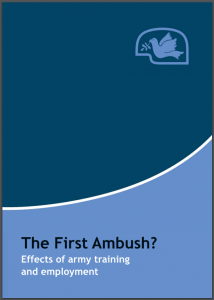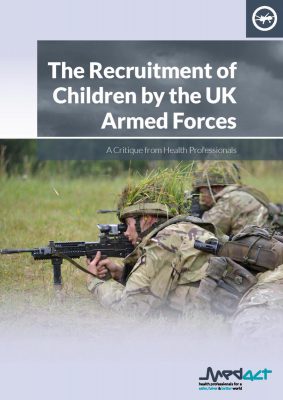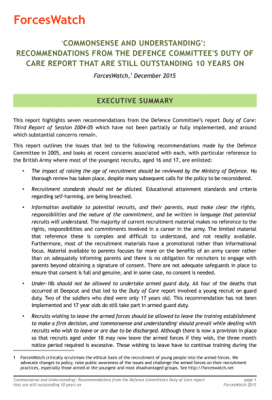mental health
Day One, Week One: Veteranhood

Excerpt from Joe Glenton's new book outlines the violence inherent in the British Army's basic training and explores what impacts this can have on mental health.
War and Memory: Moral Injury & Trauma
September 2021
Issues relating to Service Complaints system and the youngest armed forces personnel
May 2019
In this written submission to the Defence Committee's inquiry into the work of the Service Complaints Ombudsman, we focus on how issues with the complaints system may affect the youngest serving personnel in the armed forces, particularly those under 18 years old, and recommend that the youngest members of the armed forces are considered as a distinct group in relation to the functioning of the service complaints system.
Adverse health effects of recruiting child soldiers
27/02/2019BMJ Paediatrics Open
This editorial in BMJ Paediatrics Open (2019, vol 3, issue 1) discusses the issues raised in the Medact report, The recruitment of children by the UK Armed Forces: a critique from health professionals, which brought together evidence highlighting the increased risk of death and injury for those recruited under the age of 18. The authors, Reem Abu-Hayyeh and Guddi Singh, contributed to the content and launch of the report Selling the military: A critical analysis of contemporary recruitment marketing in the UK by ForcesWatch and Medact.
Evidence submitted to the Armed Forces and Veterans Mental Health Inquiry
March 2018
Written evidence submitted by ForcesWatch to the Defence Committee's Armed Forces and Veterans Mental Health Inquiry.
The First Ambush: Effects of army training and employment
June 2017

This report from Veterans For Peace UK details how the Army's training process has a forceful impact on attitudes, health, and behaviour even before recruits are sent to war. The findings show that military training and culture combine with pre-existing issues (such as a childhood history of anti-social behaviour) to increase the risk of violence and alcohol misuse. Traumatic war experiences further exacerbate the problem.
Soldiers at 16 – The other side of the story
January 2017

Army adverts don't tell you what being a soldier is really like.
The Recruitment of Children by the UK Armed Forces: a Critique from Health Professionals
October 2016

Medact’s report on the long-term impacts of the British military’s recruitment of children under the age of 18, presents evidence linking ‘serious health concerns’ with the policy, and calls for a rise in the minimum recruitment age. It looks at the psychological and psychosocial vulnerabilities of adolescents in the context of military recruitment marketing strategies and making long-term risky decisions and examines the evidence that under 18 recruits face greater risks to health than adult recruits, across the course of an armed forces career.
Soldiers at 16: Sifting fact from fiction
March 2016

Published by Child Soldiers International, this short and accessible booklet addresses questions often raised about under-18s in the armed forces, presenting the facts - based on extensive research - rather than the fiction. Also contains very useful quotes and statistics. Great when talking to your MP or for those thinking of enlisting!
‘Commonsense and Understanding’: Recommendations from the Defence Committee’s Duty of Care report that are still outstanding 10 years on
December 2015

This report highlights seven recommendations from the Defence Committee’s report Duty of Care: Third Report of Session 2004-05 which have not been partially or fully implemented, and around which substantial concerns remain.
This report then discusses the concept of 'in loco parentis' and 'moral obligation' with regard to the army's duty of care towards young recruits, noting that the Defence Committee were concerned in 2005 that the MoD distinguished too rigidly between legal and moral obligations, with the latter as less important.
In 2005, the Defence Committee discussed the lack of balance beween training needs and considerations for operational effectiveness, and thus made its recommendations. Ten years on, it is apparent that operational arguments, and current difficulties meeting recruiting targets, continue to prevent the armed forces from reviewing both their position on enlisting under-18s, and their recruitment practices and materials.
